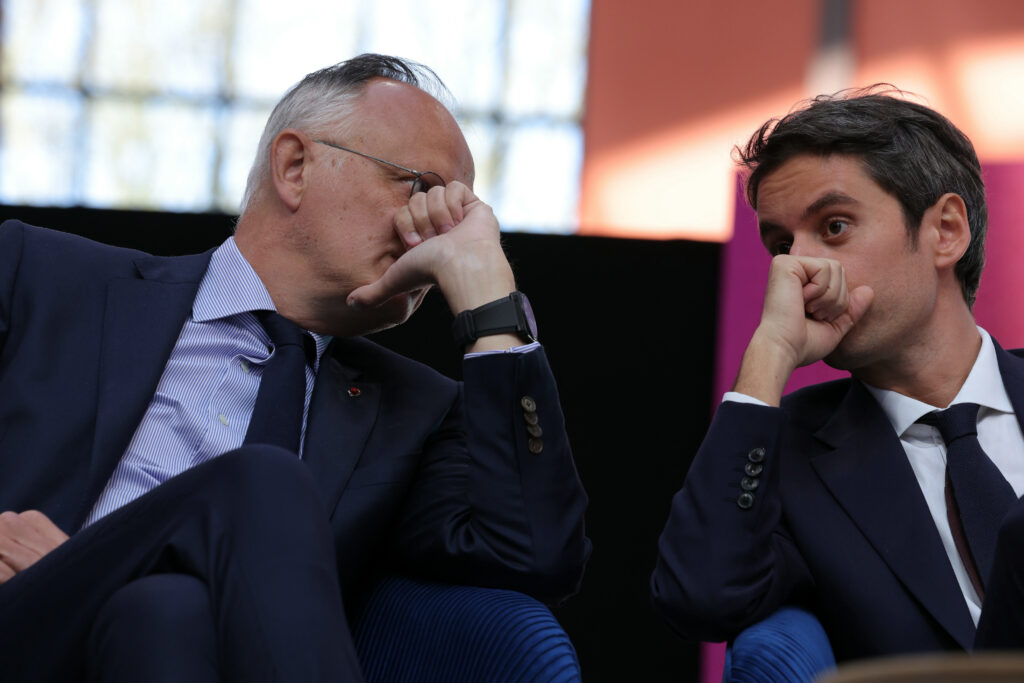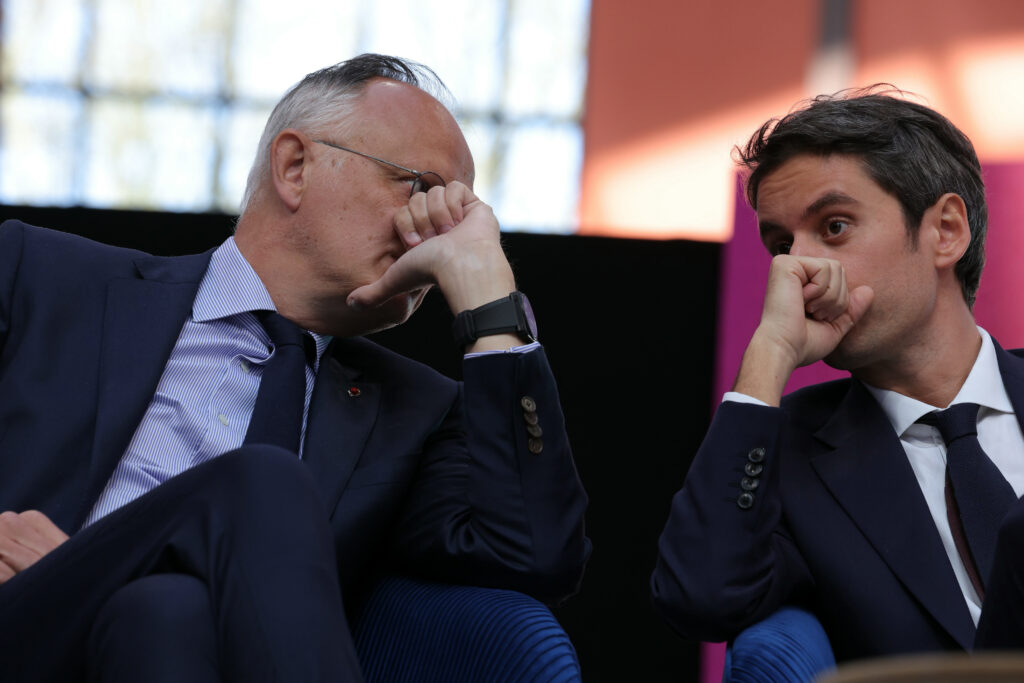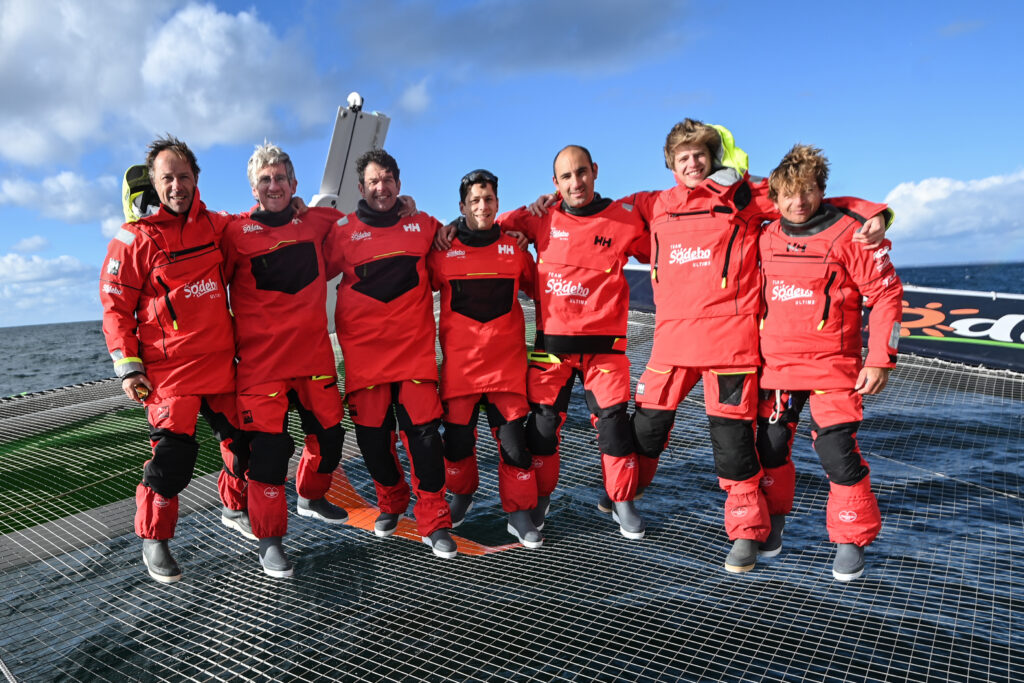Gabriel Attal, Édouard Philippe: la drôle de primaire
L’un est candidat déclaré à l’élection présidentielle. L’autre s’en cache à peine. Ces deux anciens Premiers ministres ont en commun de s’être éloignés d’Emmanuel Macron. Chacun dirige son parti, tourné vers l’Élysée. Mais ni Édouard Philippe, ni Gabriel Attal ne sont – encore – décidés à céder.Humour froid d’Élisabeth Borne. Gabriel Attal, candidat naturel de Renaissance ? “Il y a beaucoup de candidats naturels. Donc à un moment, il va falloir que tous ces candidats naturels se parlent”.Édouard Philippe et Gabriel Attal ont justement rendez-vous le 10 février au Cirque d’Hiver pour un meeting de Pierre-Yves Bournazel. Ce proche du patron d’Horizons, candidat à la mairie de Paris, a reçu le soutien du parti attaliste, au grand dam de Rachida Dati. Preuve que les deux rivaux savent s’entendre. “Leur relation est assez fluide, malgré leurs ambitions respectives”, affirme un proche de M. Philippe. “Une alliance de revers contre Macron”, brocarde un dirigeant du bloc central.Si Paris vaut bien une entente, pour l’Élysée, la messe n’est pas dite. “Ils sont tous les deux candidats, sur un ton qui n’appelle pas la discussion”, s’inquiète un allié. A seize mois du départ du président, et alors que le Rassemblement national domine les sondages, son camp est divisé. Et pour ne rien arranger, ses frontières sont mal définies. Faut-il un candidat commun avec la droite, qui gouverne avec le camp macroniste depuis la dissolution ? Les Républicains, déjà, ne manquent pas de prétendants (Bruno Retailleau, Xavier Bertrand, David Lisnard…). Mais ce scénario “socle commun” a ses adeptes chez LR (Michel Barnier) comme chez Renaissance (Gérald Darmanin). Certains plaident pour une primaire, mais personne ne s’accorde sur le périmètre. Et surtout, Édouard Philippe n’en veut pas.Pour le fondateur d’Horizons, la route de l’Élysée passe d’abord par une nouvelle victoire au Havre en mars. En attendant, un jeune proche, le conseiller d’État Clément Tonon, coordonne le programme “massif” promis après cette échéance municipale. Le parti réfléchit à un rassemblement au printemps. La campagne n’est pas encore pleinement lancée. Et les sondages se sont tassés. Dans le camp présidentiel, sa sortie sur une démission “ordonnée” d’Emmanuel Macron est mal passée.”Édouard Philippe est candidat depuis 18 mois. Quand vous perdez en dynamique, vous n’avez plus beaucoup de cartouches pour vous relancer. Il reste, effectivement, la présentation du programme…”, glisse-t-on chez Renaissance.-“Faire durer le suspense”-“On observe un très grand ralentissement chez Édouard Philippe. Si j’étais Attal, je ferais durer le suspense”, abonde une députée macroniste.Jeudi, Gabriel Attal a expliqué “beaucoup réfléchir à la manière d’exercer cette fonction de président de la République”. L’ancien Premier ministre, qui s’est emparé de Renaissance comme du groupe à l’Assemblée après la dissolution, a façonné les équipes du parti, multiplié les initiatives et opté pour des propositions “en continu” dont certaines – interdiction du voile aux moins de 15 ans, nouveau système de retraites – ont “structuré le débat public autour de nous”, juge son entourage.Nouveau chapitre: la “nuit de la Nouvelle République” – prochain nom du parti ? – mardi au Palais Brongniart. Des invités de marque (le futur Premier ministre néerlandais Rob Jetten, Alain Finkielkraut, la syndicaliste Marilyse Léon ou le représentant des PME Amir Reza-Tofighi) pour des débats aux intitulés décapants: “faut-il tout péter pour refonder la France ?” ou encore “Ecologie, économie, autorité: tout est foutu ?”.Gabriel Attal publiera un livre au printemps. Et prépare son entrée en scène. “Il peut y avoir des candidatures différentes, y compris au sein du bloc central et du socle commun. Parce qu’il faut exprimer des lignes politiques, des idées, des propositions. Et il peut y avoir un moment de rassemblement et de responsabilité d’ici à l’élection présidentielle, sous une forme ou sous une autre”, entend-on chez Renaissance.Horizons reste de marbre. “Que Bruno Retailleau et Gabriel Attal tentent de jouer leur partition après les municipales, on ne peut pas le leur reprocher. Comment faire vivre un parti comme Renaissance ou comme Les Républicains sans dire qu’on a un projet pour la présidentielle, et éventuellement un candidat ?”, déroule un dirigeant.Mais “est-ce qu’Attal peut soutenir Retailleau au premier tour ? Est-ce que Retailleau peut soutenir Attal au premier tour?”, poursuit cette source, sceptique. Qui voit en Édouard Philippe “le bon point de convergence” du centre et de la droite.
Gabriel Attal, Édouard Philippe: la drôle de primaire
L’un est candidat déclaré à l’élection présidentielle. L’autre s’en cache à peine. Ces deux anciens Premiers ministres ont en commun de s’être éloignés d’Emmanuel Macron. Chacun dirige son parti, tourné vers l’Élysée. Mais ni Édouard Philippe, ni Gabriel Attal ne sont – encore – décidés à céder.Humour froid d’Élisabeth Borne. Gabriel Attal, candidat naturel de Renaissance ? “Il y a beaucoup de candidats naturels. Donc à un moment, il va falloir que tous ces candidats naturels se parlent”.Édouard Philippe et Gabriel Attal ont justement rendez-vous le 10 février au Cirque d’Hiver pour un meeting de Pierre-Yves Bournazel. Ce proche du patron d’Horizons, candidat à la mairie de Paris, a reçu le soutien du parti attaliste, au grand dam de Rachida Dati. Preuve que les deux rivaux savent s’entendre. “Leur relation est assez fluide, malgré leurs ambitions respectives”, affirme un proche de M. Philippe. “Une alliance de revers contre Macron”, brocarde un dirigeant du bloc central.Si Paris vaut bien une entente, pour l’Élysée, la messe n’est pas dite. “Ils sont tous les deux candidats, sur un ton qui n’appelle pas la discussion”, s’inquiète un allié. A seize mois du départ du président, et alors que le Rassemblement national domine les sondages, son camp est divisé. Et pour ne rien arranger, ses frontières sont mal définies. Faut-il un candidat commun avec la droite, qui gouverne avec le camp macroniste depuis la dissolution ? Les Républicains, déjà, ne manquent pas de prétendants (Bruno Retailleau, Xavier Bertrand, David Lisnard…). Mais ce scénario “socle commun” a ses adeptes chez LR (Michel Barnier) comme chez Renaissance (Gérald Darmanin). Certains plaident pour une primaire, mais personne ne s’accorde sur le périmètre. Et surtout, Édouard Philippe n’en veut pas.Pour le fondateur d’Horizons, la route de l’Élysée passe d’abord par une nouvelle victoire au Havre en mars. En attendant, un jeune proche, le conseiller d’État Clément Tonon, coordonne le programme “massif” promis après cette échéance municipale. Le parti réfléchit à un rassemblement au printemps. La campagne n’est pas encore pleinement lancée. Et les sondages se sont tassés. Dans le camp présidentiel, sa sortie sur une démission “ordonnée” d’Emmanuel Macron est mal passée.”Édouard Philippe est candidat depuis 18 mois. Quand vous perdez en dynamique, vous n’avez plus beaucoup de cartouches pour vous relancer. Il reste, effectivement, la présentation du programme…”, glisse-t-on chez Renaissance.-“Faire durer le suspense”-“On observe un très grand ralentissement chez Édouard Philippe. Si j’étais Attal, je ferais durer le suspense”, abonde une députée macroniste.Jeudi, Gabriel Attal a expliqué “beaucoup réfléchir à la manière d’exercer cette fonction de président de la République”. L’ancien Premier ministre, qui s’est emparé de Renaissance comme du groupe à l’Assemblée après la dissolution, a façonné les équipes du parti, multiplié les initiatives et opté pour des propositions “en continu” dont certaines – interdiction du voile aux moins de 15 ans, nouveau système de retraites – ont “structuré le débat public autour de nous”, juge son entourage.Nouveau chapitre: la “nuit de la Nouvelle République” – prochain nom du parti ? – mardi au Palais Brongniart. Des invités de marque (le futur Premier ministre néerlandais Rob Jetten, Alain Finkielkraut, la syndicaliste Marilyse Léon ou le représentant des PME Amir Reza-Tofighi) pour des débats aux intitulés décapants: “faut-il tout péter pour refonder la France ?” ou encore “Ecologie, économie, autorité: tout est foutu ?”.Gabriel Attal publiera un livre au printemps. Et prépare son entrée en scène. “Il peut y avoir des candidatures différentes, y compris au sein du bloc central et du socle commun. Parce qu’il faut exprimer des lignes politiques, des idées, des propositions. Et il peut y avoir un moment de rassemblement et de responsabilité d’ici à l’élection présidentielle, sous une forme ou sous une autre”, entend-on chez Renaissance.Horizons reste de marbre. “Que Bruno Retailleau et Gabriel Attal tentent de jouer leur partition après les municipales, on ne peut pas le leur reprocher. Comment faire vivre un parti comme Renaissance ou comme Les Républicains sans dire qu’on a un projet pour la présidentielle, et éventuellement un candidat ?”, déroule un dirigeant.Mais “est-ce qu’Attal peut soutenir Retailleau au premier tour ? Est-ce que Retailleau peut soutenir Attal au premier tour?”, poursuit cette source, sceptique. Qui voit en Édouard Philippe “le bon point de convergence” du centre et de la droite.
La cravate au féminin, entre accessoire de mode et symbole d’émancipation
Nicole Kidman, Demi Moore, Bella Hadid… Des actrices et mannequins arborent sans complexe la cravate, accessoire masculin par excellence, un geste qui prend une résonance particulière à l’heure où les droits des femmes vacillent.Qu’elle soit assortie à un tailleur pantalon, comme Nicole Kidman en février 2025 lors de la cérémonie des Critics Choice Awards, ou à une robe noire et une chemise transparente, comme Demi Moore en novembre dernier à Berlin, la cravate, cet accessoire longtemps associé aux hommes en costume et au monde du travail, refait surface depuis quelques saisons dans le vestiaire féminin.Popularisée sur les tapis rouges dans les années 1970 par la regrettée actrice américaine Diane Keaton, la cravate a été plébiscitée récemment par les mannequins Bella Hadid ou Loli Bahia, qui ont toutes deux succombé au style boyish.”On la voit non seulement sur les tapis rouges, mais aussi au cœur des sphères de pouvoir politiques et économiques, où de grandes dirigeantes portent un accessoire qui, jusqu’à récemment, restait presque exclusivement masculin”, observe auprès de l’AFP la spécialiste de la mode Patrycia Centeno.”C’est une manière de revendiquer la place des femmes dans un monde et un système qui demeurent profondément patriarcaux”, souligne cette experte de la communication non verbale. Les influenceuses ont également contribué à installer la cravate dans les silhouettes féminines. – Émancipation féminine -Cet accessoire, dont les précurseurs pourraient être les foulards noués autour du cou que portaient les mercenaires croates au XVIIe siècle, avait déjà fait, à plusieurs reprises, son apparition dans la garde-robe féminine. À partir du XIXe siècle, la cravate avait été adoptée par les intellectuelles françaises George Sand et Colette. Elle a aussi été arborée par les suffragettes britanniques au début du XXe siècle. L’accessoire est brandi par certaines féministes comme “un signe de conquête de droits et puis de visibilité dans l’espace public”, rappelle Marine Chaleroux, historienne de la mode.L’actrice allemande Marlene Dietrich et la créatrice de mode Coco Chanel s’en sont également emparées. Dans les années 1980-1990, lorsque les femmes commencent à gravir les échelons professionnels, la cravate devient une “symbolique visuelle de cet accès de plus en plus important à des fonctions importantes de dirigeantes de grandes entreprises ou de hauts postes”, ajoute Marine Chaleroux.Ces retours cycliques de la cravate dans le vestiaire féminin coïncident souvent “avec des périodes de fragilité où les droits sont remis en question”, observe l’historienne.- “Politique testostéronée” -Un constat qui trouve un écho particulier aujourd’hui, au moment où de nombreuses organisations féministes dénoncent un recul des droits des femmes dans le monde à l’heure où les discours réactionnaires se multiplient.Actuellement, “nous sommes confrontés à une approche politique (…) très testostéronée”, souligne Patrycia Centeno, rappelant que la cravate est le grand accessoire représentatif du “symbole phallique”.”Le féminisme cherche souvent à s’approprier des signes qui, socialement et culturellement, ont longtemps été réservés aux hommes afin d’affirmer, voire de normaliser visuellement, le fait qu’une femme puisse exercer le pouvoir et diriger”, explique-t-elle.Remise au goût du jour par les femmes, la cravate fait par ailleurs depuis peu son retour sur les podiums masculins.Lors des défilés de mode masculine à Paris cette semaine, elle était presque de tous les shows, de Louis Vuitton à Dries Van Noten, en passant par Issey Miyake.Mais sous l’influence d’un usage féminin jugé “plus créatif”, la mode masculine voit émerger “des cravates presque streetwear, portées avec des pantalons très amples, sur des tee-shirts, des hoodies, ou même sciemment mal portées”, comme chez Dior, souligne Marc Beaugé, directeur du semestriel de mode masculine L’Étiquette. De quoi transformer cet accessoire “totalement inutile, très traditionnel, très masculin, qui exige une grande précision au niveau du col, du nœud et de la longueur” en sorte de “sucrerie fashion”, assure-t-il.
Trophée Jules Verne: Coville et les siens s’offrent le record absolu autour du monde
Infatigable et pugnace, Thomas Coville (Sodebo) a bouclé dimanche matin son dixième tour du monde à la voile en 40 jours 10 heures et 45 minutes avec son courageux équipage de six marins, nouveau record absolu à la clef.Parti le 15 décembre au large d’Ouessant, Sodebo Ultim 3 a amélioré de 12 heures et 44 minutes le record du Trophée Jules Verne, créé en 1993 en référence au célèbre roman “Le Tour du monde en 80 jours”, et à son héros Phileas Fogg.Le maxi-trimaran, ralenti ces derniers jours par la tempête Ingrid, a franchi la ligne située entre le phare de Créac’h et le phare de Lizard Point, en Angleterre, à 7h46 (GMT+1), a annoncé son équipe.Sodebo a parcouru 28.315 milles (52 440 kilomètres) à la vitesse moyenne de 29,17 nœuds (50 km/h). Coville, Benjamin Schwartz, Léonard Legrand, Frédéric Denis, Pierre Leboucher, Guillaume Pirouelle et Nicolas Troussel sont désormais attendus dans le port de Brest aux alentours de 11 heures pour des célébrations nourries.Le quatrième essai depuis 2020 aura été le bon pour Coville, digne successeur de Francis Joyon qui, en 2017 à bord d’Idec Sport, avait signé un temps stratosphérique de 40 jours et 23 heures, sur lequel de nombreux marins ont buté.- “Sur le fil du rasoir” -Malgré un début de tour du monde canon marqué par un premier record – la traversée Ouessant/Bonne-Espérance en 10 jours et 23 heures seulement -, le suspense aura duré jusqu’au bout entre les “Sodeboyz” et le fantôme de l’équipage de Joyon.Dépassés à l’antiméridien, les hommes de Thomas Coville ont repris les commandes au cap Horn, mais ont ensuite dû affronter dans le sprint final vers la Bretagne la tempête Ingrid, ses dix mètres de creux et ses coups de vent à près de 100 km/h.”Nous avons fait une sacrée rencontre. Les 36 dernières heures ont été les plus difficiles et les plus longues de cette tentative: nous avons abîmé plus de choses que pendant tout le tour du monde”, a souligné le skipper de 57 ans dans une vidéo envoyée depuis le bord samedi.”Une déferlante a arraché un support qui permettait de monter et descendre le safran. On s’en sort bien puisqu’il reste opérationnel. Forcément, ça ajoute une tension et un stress supplémentaires à bord, la sensation d’être sur le fil du rasoir”, a-t-il ajouté.Une deuxième dépression se formant au large de l’Irlande balayait encore au petit matin la zone d’arrivée, ce qui a obligé l’équipage à réaliser un ultime empannage avant de pouvoir lever les bras, à une trentaine de kilomètres des côtes.- Consécration -Pour Coville, il s’agit d’une magnifique consécration. Ce marin chevronné, affable et meneur d’hommes, enlève son 3e Trophée Jules Verne après ses périples d’équipier pour De Kersauson en 1997 et Franck Cammas en 2010. Le premier en tant que skipper.Ce succès valide également les choix de son sponsor historique qui lui fait confiance depuis 1999 – une éternité à l’échelle du sport – et a mis la main à la poche en 2017 pour lancer la construction d’un onéreux maxi-trimaran, avec déjà le tour du monde dans le viseur.Mis à l’eau en 2019 après 110.000 heures de travail, Sodebo Ultim 3 a mis du temps à trouver son rythme de croisière, longtemps moins véloce que ses principaux concurrents de la classe Ultim.Mais au gré des courses et des tentatives autour du monde, il est devenu une référence en matière de fiabilité, une qualité essentielle pour s’emparer du mythique Trophée Jules Verne.En tout cas, ni le skipper ni son bateau ne sont au bout de leur aventure commune. Une troisième génération de foils est actuellement en construction à Lorient pour tenter de gagner la prochaine Route du Rhum à la fin de l’année.
Hollywood stars slam ICE after fatal Minneapolis shooting
Hollywood stars used red carpet appearances at the Sundance Film Festival on Saturday to denounce the killing of an American protester who was shot dead on the streets of Minneapolis by federal immigration agents.Actress Olivia Wilde, who was in Park City, Utah, for the premiere of “The Invite,” said the death of a second protester in just three weeks at the hands of federal agents was “unfathomable.””I can’t believe that we’re watching people get murdered in the street,” she told AFP.”These brave Americans who have stepped out to protest the injustice of these ICE quote/unquote ‘officers,’ and watching them be murdered — it’s unfathomable. We cannot normalize it.”Wilde’s comments come after the killing of 37-year-old ICU nurse Alex Pretti, who died after being pinned to the ground and shot multiple times by federal agents.Pretti’s death came weeks after an Immigration and Customs Enforcement (ICE) officer shot and killed Renee Good, also 37, in her car in the city.Wilde, who wore an “ICE OUT” badge, said the US government violence against people exercising their right to free expression was “un-American.””We may have a government that is somehow trying to make excuses for it and legitimize it, but we (Americans) don’t.”Fellow actress Natalie Portman, who was promoting “The Gallerist,” got emotional as she described her feelings over a “horrible day.””What is happening in our country is just obscene,” she told AFP in Park City.”What (President Donald) Trump and (Homeland Security Secretary) Kristi Noem and ICE are doing to our citizens and to undocumented people is outrageous and needs to end.”





